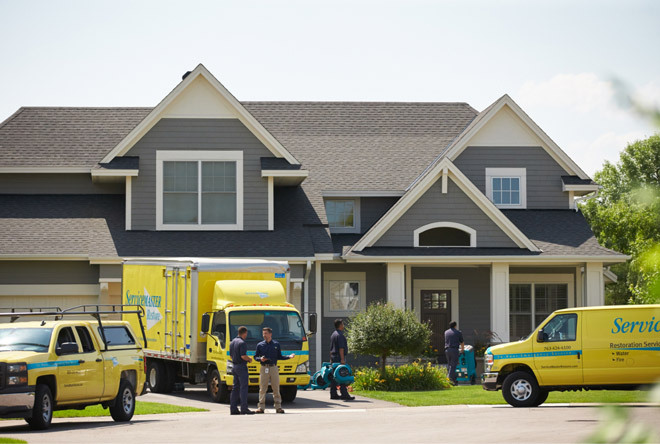Continuing Education
As an insurance professional, you're often the first contact for a policyholder who has experienced a disaster. The more you know about the disaster mitigation process and recovery, the more you can guide your client in taking the right steps to control damage - and therefore control costs. With Continuing Education (CE) options from ServiceMaster Restore®, you and your staff can be better equipped to help your policyholders by understanding the latest disaster restoration techniques, procedures and best practices.
Courses designed to help you provide greater service to your customers
As an approved CE provider in 46 states, we have developed curricula that emphasize the cost-saving benefits of quick response and correct action in variety of critical areas. In addition to helping you understand the effects of a disaster and the steps involved in restoring the structure as well as the contents, these courses give you the knowledge needed to put our policyholders at ease. Not all courses are approved for all states.
Continue to be your best with these Continuing Education courses
Water Damage Mitigation
This course demonstrates how water can damage carpet, wood floors and other building materials, how long until damage occurs and what steps can be taken to reduce or minimize the damage. The course also illustrates water removal and explains the principles of drying and dehumidification. Mold growth, the use of antimicrobials and odor control are also covered.
Reducing Severities Through Restorative Structural Drying
This is a hands-on seminar for the latest information, equipment, procedures, and recommended certifications needed for water extraction and drying out of structures affected by water intrusion. Topics covered include the effects of water saturation on various structural materials, evaluation of water losses, industry standards for drying, measurement and documentation, restoration processes, equipment and technology, modern drying paradigms and an overview of the science of drying (psychrometry).
Water Damage Mitigation for Manufactured Homes
This course focuses restoration of mobile/modular homes after a water loss. It covers differences between two types of manufactured homes and the unique construction features that may impact decisions made during water mitigation.
Subrogation Reporting on Mitigation Claims
This course is designed to help agents and adjusters control claims costs through subrogation investigation and reporting and teaches them the value of mitigation first responders in achieving this objective.
Flood Insurance
To provide property and casualty insurance agents and adjusters an increased understanding of flood insurance and the benefits for their customers. Topics covered include the National Flood Insurance Program (NFIP) and the Federal Emergency Management Agency (FEMA).
Mold Remediation
This program introduces the science of mold and explores the potentially harmful effects of mold on building materials and occupants. Participants learn how mold grows, how it spreads and what actions should be taken to remove mold in a safe and reasonable manner. Procedures such as containment, negative air and the proper use of personal protective equipment are also covered.
Mold Remediation Removal and Containment
This course educates attendees on mold detection, the removal/containment process, the source of and growth requirements, health effects associated with exposure, removal myths, proper vs. improper clean-up methods, and containment and safety.
Smoke and Odor Damage Mitigation
This course shows how smoke and odor flow throughout a home, the damage it causes and what should be done about it. This course also reviews the proper smoke mitigation steps, which can reduce the loss.
Odor Mitigation
Odor is often associated with pet contamination, fire/smoke, and water/mold issues. Given this, insurance professionals who are informed about Odor Mitigation can better support their customers during the claims process. Claimants benefit by the insurance professionals' increase in knowledge of odor, which in many instances can reduce costs or additional claims expenses, expedite the claims process, and provide a better customer experience by setting expectations and meeting the needs of the customer.
Mitigating Personal Property Packout Claims
This course demonstrates how technology is enabling the restoration professional to manage and track packout inventory, movement and restoration better than ever before, while giving the homeowner or business manager a sense of security about the process. The course covers the tools and technology of evaluating, restoring and tracking inventory from start to finish.
Reducing Severities Through an Understanding of Furniture Damage & Restoration
This course educates participants on the various causes and types of damage that can occur to fine furniture and wood surfaces in a property loss situation.
Ethics: If You Don't Live it, You Don't Believe It
This course is designed to provide a practical look at ethical decision-making. Instead of relying on "gut feel," the process contained in this program takes the decision-maker through several filters, which ensure that all parties affected by the decision are considered.
Insurance Fraud
This course focuses on the history, laws and statistics relating to the fraudulent insurance crimes that take place every day in America.
Errors and Omissions in the Insurance Industry
This course looks at E & O from multiple angles. Error & omission lawsuits can be one of the most frightening experiences for an insurance provider. With an ever-changing litigious society, the chances are increasing greatly.
Trauma and Bio-Hazard Losses
What can the customer expect from a quality restoration firm in dealing with Trauma and Bio-Hazard losses? Understanding the unique losses that are classified as Trauma and Bio-Hazard cleaning is the first step in understanding how to respond to the customers' needs. How these types of losses are handled greatly impact customer retention for the insurance company.
Hoarding (selective states)
This course covers why hoarding is important to Insurance Companies, Adjusters and Insurance Professionals. It is designed to help the audience understand hoarders, assist them in identifying a hoarder, and educates them on how to handle a loss properly when a hoarder is involved. It also covers the impact on the claims process and claim cost as well as concerns that arise when a loss of this type is encountered.


